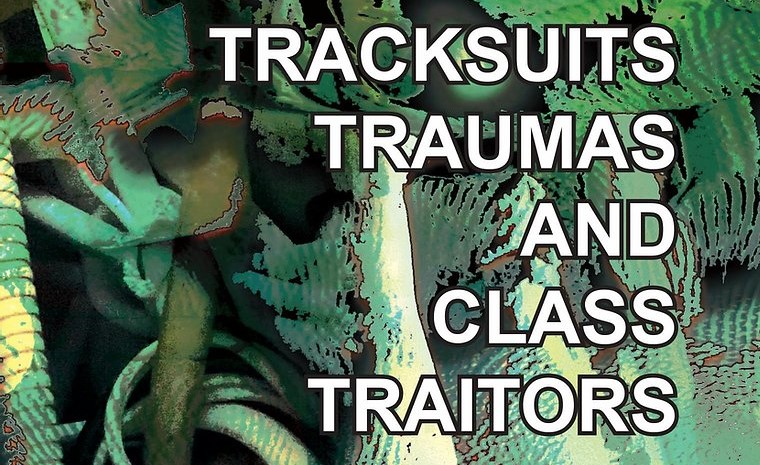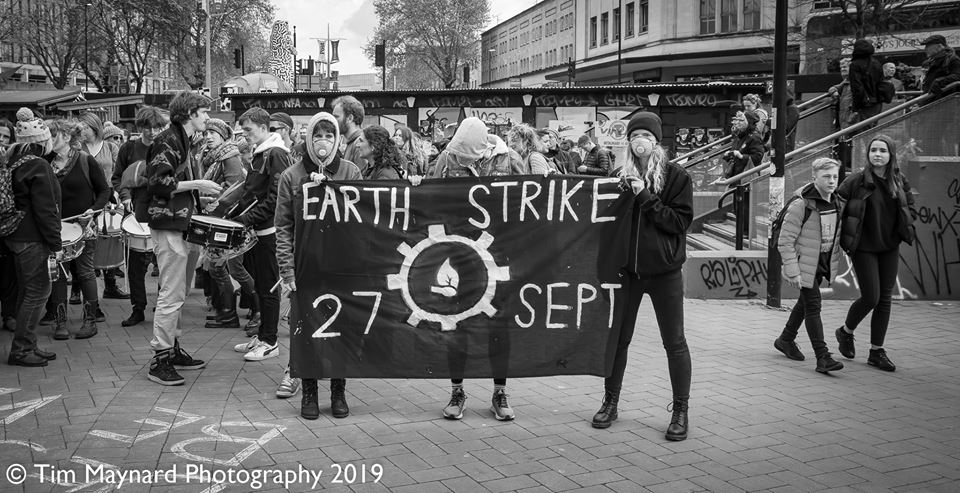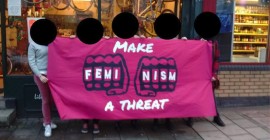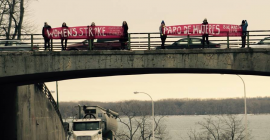I was lucky enough to be present at the first performance of Alice Nutter’s My Generation at the West Yorkshire Playhouse in Leeds last night. The play, almost but not quite a musical, centres on the lives of two generations of a family and their extended household/network of friends and comrades as they wind their way through and around the feminist struggles of the late seventies, the miners’ strike, the free party movement, and the present age of austerity and precarious labour. Armed with pride, kindness, and a dignity that manages to emerge intact even from exposure to performance poetry and excessive use of booze and class As, the participants in these struggles trip, stumble, fight, dance, fuck, and hug their way together through innumerable attacks on their humanness, from capital, the state, Thatcher, the Yorkshire Ripper, undercover cops, moral dogma, and poverty
Unseen or unrecognized struggle and its complex interweaving with unseen or unrecognized labour was for me a crucial part of the narrative of the play. On a more explicit level, this is visited in one character’s invocation of Marx’s old mole quietly undermining until the structures above the surface collapse in on themselves in a way that seems miraculous to those unengaged with social movements. The whole of the 1977 section is also structured around this idea though, with its subtle problematizing of the valorisation of overt activism over invisible social reproductive struggles (a situation made considerably more difficult by the presence of the ripper and the state’s success at exploiting this fact as a tool of mobilisation against women’s organising). The fantastic thing about this theme though is that it is also worked into the production itself, outside the story so to speak. The less glamorous, hidden labour of the stage hands is performed by the actors, the musicians are also actors, the actors also perform the music, all these tasks with their varying levels of associated kudos are tackled collectively and with the same seriousness. Wondering if I’d read too much into it, I put this to Nutter afterwards who told me that it had been important from early on in the process to talk together about working collectively and as a gang. This mirroring between the collective projects in the narrative and the actual collective project unfolding in the theatre in front of the audience is an extremely powerful device.
Without wishing to undermine that collectivity, amongst the innumerable excellent performances, Craig Gazey who plays the adult Benjamin, should perhaps be given special mention for an incredible comic timing that had much of the audience in fits. The music too, arranged by Harry Hamer and performed by a live three-piece band along with various members of the cast, is a noteworthy and important part of the play. Both Nutter and Hamer were members of the group Chumbawamba so it makes perfect sense that we should be provided with something of a musical filter through which to experience the 36 years covered here. (It’s also an opportunity for some self-depreciating humour such as references to the ‘crap punk bands’ that performed at miners’ benefits)
I must confess to having shed a couple of tears towards the end. It was difficult not to feel an intense tenderness towards the main characters and their struggles to remain human, replete with flaws, failings, and disappointment as well as a great deal of love. Indeed, from the general audience reaction as well as from conversations I participated in and eavesdropped on after the performance, there seemed to be a real sense that this was in some way our play. This was due in part, I think, to Nutter’s skill at drawing out the warm blooms of commonality produced by the simple actions of day-to-day reproduction of our selves, our communities, and our households. There’s a great line a little before the interval where Valley, a welsh anarchist poet, is performing at a miners’ benefit and reflects on the fact that irrespective of the outcome of the strike, the difference on the level of affect between the miners and their comrades, struggling for themselves and for each other, and the police officers being paid by the state to crush them, will be profound. The theme is poignantly revisited in the final song with its belted out line ‘at least I fucking tried’.
And there lies the rub. What better an antidote to the government’s ‘strivers versus skivers’ discourse? The main characters in My Generation aren’t zealots, they’re not martyrs, they’re not part of a cult. They’re doing the same things working class families are doing everywhere in order to resist the dehumanising effects of capitalism. It involves a fuck-load of trying, a fuck-load of failing, and a fuck-load of invention, resourcefulness, and creative labour and above all it involves comrades.
Oh and I don’t want to ruin it for people who haven’t seen it but watch out for the most menacing use of choreographed movement since Jackson’s Thriller.
GB
My Generation is on at the West Yorkshire Playhouse in Leeds until 26th October










